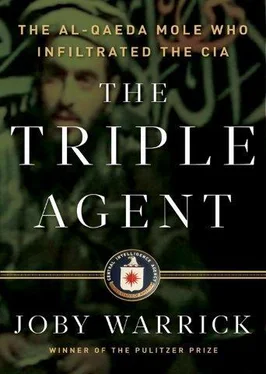Now Matthews could see the station wagon entering the compound where she and the others were waiting. Matthews had asked bin Zeid and LaBonte to greet Balawi while she and the other officers kept a respectful distance, spread out in a crude reception line beneath the awning. She began making her way to a spot at the front of the line, straightening her clothes as she walked.
Security chief Scott Roberson and the two Blackwater guards unslung their rifles and made their way across the gravel lot, but the arriving Outback cut them off. The car rolled to a halt with the driver’s door positioned directly in front of the spot where Matthews was standing. Arghawan was alone in the front seat, his face nearly obscured by the thick film of dust that coated the windows. The figure sitting directly behind him in the backseat was hunched forward slightly, and Matthews strained to make out the face. The engine was cut, and in an instant Roberson was opening the rear door next to Balawi.
The man inside hesitated, as though studying the guards’ weapons. Then, very slowly, he slid across the seat away from the Americans and climbed out on the opposite side of the car.
Now he was standing, a short, wiry man, perhaps thirty, with dark eyes and a few matted curls visible under his turban. He was wearing a beige, loose-fitting kameez shirt of the type worn by Pashtun tribesmen and a woolen vest that made him look slightly stout around the middle. A long gray shawl draped his shoulders and covered the lower part of his face and beard. The man reached back into the car to grab a metal crutch, and as he did, the shawl fell away to reveal a wispy beard and an expression as blank as a marble slab.
As the others watched in confused silence, the man started to walk around the front of the car with an awkward, stooped gait, as though struggling under a heavy load. He was mumbling to himself.
Bin Zeid waved to Balawi but, getting no response, called out to him.
“ Salaam, akhoya . Hello, my brother,” bin Zeid said. “Everything’s OK!”
But it wasn’t. Blackwater guards Paresi and Wise had instinctively raised their guns when Balawi balked at exiting on their side of the car. Paresi, the ex–Green Beret, watched with growing alarm as Balawi hobbled around the vehicle, one hand grasping the crutch and the other hidden ominously under his shawl. Paresi tensed, finger on the trigger, eyes fixed on the shawl with instincts honed in dozens of firefights and close scrapes. One shot would drop the man. But if he was wrong—if there was no bomb—it would be the worst mistake of his life. He circled around the car keeping the ambling figure in his gun’s sight. Steady. Wait. But where’s that hand?
Now he and Wise were shouting almost in unison, guns at the ready.
“Hands up! Get your hand out of your clothing!”
Balawi’s mumbling grew louder. He was chanting something in Arabic.
“La ilaha illa Allah!” he was saying.
There is no god but God .
Bin Zeid heard the words and knew, better than anyone, exactly what they meant.
McLean, Virginia—One year earlier
For nearly three years the whereabouts of Osama bin Laden and his top generals had been Michael V. Hayden’s daily obsession, a throbbing migraine that intruded on his consciousness at odd hours of the night. But as he turned the page on his final month as CIA director, it was a different Osama that was costing him sleep. Before New Year’s Day was over, Hayden would have to decide whether the man would live or die.
The man was called Osama al-Kini, and he had been the subject of an increasingly frantic search. The boyish onetime soccer player from Kenya had moved up in al-Qaeda’s ranks, starting as a truck driver and bomb maker and rising to become a top operations planner with a flair for the spectacular. He was preparing a list of targets for a wave of strikes across Western Europe when the CIA caught a lucky break. In late December, the agency had spotted one of al-Kini’s top deputies in a town in northwestern Pakistan, and now it was following him, with eyes on the ground and robot planes circling silently above. Cameras whirring, it trailed him as he wandered through the bazaars, sat for tea, or climbed the hilly street to the abandoned girls’ school where he sometimes stayed the night. Agents watched for hours, and then days, waiting to see who would come to meet him. As the graveyard shift at the CIA’s Langley, Virginia, headquarters rang in the first minutes of 2009, the watchers sensed that they were finally getting close.
New Year’s Day found Hayden attempting to enjoy a rare day off. He tried to relax with family and even took in a couple of football games, but the phone summoned him back to the hunt. From his basement office, with its twenty-four-hour security detail and secure line to headquarters, he mulled the latest updates from Pakistan. Keep watching , he ordered. Then, when late evening arrived without further news, Hayden decided to turn in for the night. He switched on his TV and sat on the bed. It was the Orange Bowl game from Miami, and Virginia Tech was pounding Cincinnati. He stretched out and tried to concentrate on the game.
At sixty-three, Hayden was no one’s vision of a killer. The retired four-star general had been a career intelligence man in the air force who moved up to become head of the National Security Agency, overseeing the country’s vast overseas eavesdropping network. In 2006 he was President George W. Bush’s pick for the CIA’s third director in two years, inheriting a demoralized spy agency in need of a wise uncle to pay bail and clean up the damage. Hayden’s charge, simply put, was to restore stability and even a kind of bureaucratic blandness to the CIA after multiple scandals over the alleged kidnapping and torture of suspected terrorists. One of his stated ambitions going in: to get the CIA out of the headlines. “The agency needs to be out of the news, as source or subject,” he told the Washington Post in an interview.
Hayden was born to Irish Catholic parents in Pittsburgh and maintained lifelong ties to that working-class city, returning home on fall weekends to root for the Steelers or for the football squad at his alma mater, Duquesne University. He liked talking in sports analogies, and, as CIA director he enjoyed mingling with young analysts in the agency cafeteria, his bald pate and easy smile making him a reassuring, rather than an intimidating, presence for junior staffers. The mechanics of finding and eliminating specific terrorist threats seemed to fall more naturally to Hayden’s chief deputy, Stephen R. Kappes, a legendary case officer who had made his mark matching wits against the Soviet KGB in Moscow.
But now, in his third year as director, Hayden was in charge of the most relentlessly lethal campaign in the spy agency’s history. After the terrorist attacks of September 11, 2001, the CIA had devoted itself to hunting down bin Laden and his followers with the aim of capturing, imprisoning, and interrogating them. Now the agency had a different goal: killing the terrorists and their allies wherever they could be found. The agency had slowly built up a fleet of pilotless aircraft, called Predators, capable of firing missiles by remote control. In mid-2008, as the Bush administration entered its final months, the CIA unleashed the planes, commonly referred to as drones, in an all-out war against al-Qaeda. CIA missiles blasted terrorist safe houses and training camps week after week, and the finger on the trigger was Hayden’s.
The transformation had been years in the making. In the middle years of the decade, as the Bush administration poured troops and resources into Iraq, al-Qaeda had staged a comeback in the mountains of northwestern Pakistan. The demoralized bands of Arab fighters who had streamed out of Afghanistan in late 2001 regrouped under their old generals, bin Laden and his operations chief, Ayman al-Zawahiri, and a new generation of aggressive commanders replaced those who had been killed or captured. From new sanctuaries in the rugged no-man’s-land between the two countries, they quietly began reopening training camps, raising money, and plotting new attacks against the United States and Western Europe. The agency’s wire intercepts crackled with vague but ominous talk about surveillance missions and dry runs targeting airliners, shopping centers, tourist resorts, and hotels—threats most Americans would never hear about.
Читать дальше












